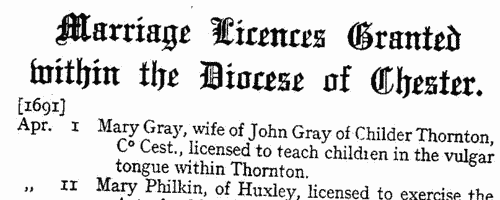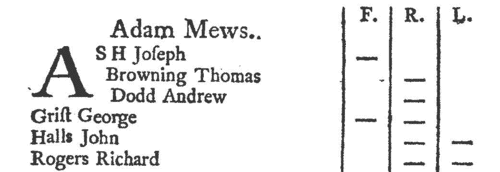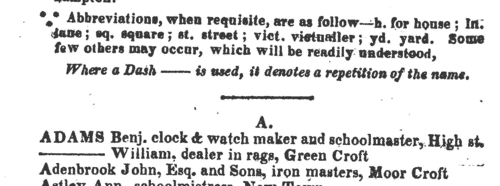Horrobin Surname Ancestry ResultsOur indexes 1700-1999 include entries for the spelling 'horrobin'. In the period you have requested, we have the following 36 records (displaying 1 to 10): Single Surname Subscription | | | Buying all 36 results of this search individually would cost £204.00. But you can have free access to all 36 records for a year, to view, to save and print, for £100. Save £104.00. More... |
These sample scans are from the original record. You will get scans of the full pages or articles where the surname you searched for has been found. Your web browser may prevent the sample windows from opening; in this case please change your browser settings to allow pop-up windows from this site. Nottinghamshire Marriage Licences
(1577-1700)
Nottingham Archdeaconry, which was almost coextensive with the county of Nottingham, lay in the diocese and province of York, but it had substantially independent jurisdiction for both probate and the issuing of marriage licences. These are abstracts of the archdeaconry marriage licences: they usually state the groom's address, occupation, age, and condition; the bride's address, age and condition; and the names of the churches or parishes at which it was intended the marriage would be celebrated. Not all licences led to marriages. Where the age given is 21, it should be construed as '21 or over'. There was no obligation for the marriage to take place at the parish suggested, but the licence would only be valid within the county. These abstracts have been annotated with extra information found on the marriage bonds. 26 Nottinghamshire parishes (Beckingham, Darlton, Dunham, Eaton, North Leverton, Ragnall, Rampton, South Wheatley, Cropwell Bishop, Bleasby, Blidworth, Calverton, Caunton, Edingley, Farnsfield, Halloughton, Holme, Kirklington, Morton, North Muskham, Norwell, Oxton, South Muskham, Southwell, Upton and Woodborough) lay within the small peculiar jurisdiction of Southwell, which issued its own licences: abstracts of these for the period 1588 to 1754 are also included here.HORROBIN. Cost: £4.00.  | Sample scan, click to enlarge

| Lancashire and Cheshire Marriage Licences
(1691-1700)
Licences for intended marriages in Chester archdeaconry, which covered Cheshire and Lancashire south of the Ribble (by far the most populous part of that county). As shown in the sample scan, licences to practise midwifery and to teach are also included. The index covers bondsmen as well as brides and grooms.HORROBIN. Cost: £4.00.  | Sample scan, click to enlarge

|  Masters and Apprentices
(1719) Masters and Apprentices
(1719)
Apprenticeship indentures and clerks' articles were subject to a 6d or 12d per pound stamp duty: the registers of the payments usually give the master's trade, address, and occupation, and the apprentice's father's name and address, as well as details of the date and length of the apprenticeship. 22 June to 31 December 1719.HORROBIN. Cost: £8.00.  | Sample scan, click to enlarge

|  Apprentices registered at Colchester in Essex
(1720-1723) Apprentices registered at Colchester in Essex
(1720-1723)
Apprenticeship indentures and clerks' articles were subject to a 6d or 12d per pound stamp duty: the registers of the payments usually give the master's trade, address, and occupation, and the apprentice's father's name and address, as well as details of the date and length of the apprenticeship. There are central registers for collections of the stamp duty in London, as well as returns from collectors in the provinces. These collectors generally received duty just from their own county, but sometimes from further afield. Because of the delay before some collectors made their returns, this register includes indentures and articles from as early as 1719. (The sample entry shown on this scan is taken from a Norfolk return)HORROBIN. Cost: £8.00.  | Sample scan, click to enlarge

|  Apprentices registered in Lancashire
(1720-1723) Apprentices registered in Lancashire
(1720-1723)
Apprenticeship indentures and clerks' articles were subject to a 6d or 12d per pound stamp duty: the registers of the payments usually give the master's trade, address, and occupation, and the apprentice's father's name and address, as well as details of the date and length of the apprenticeship. There are central registers for collections of the stamp duty in London, as well as returns from collectors in the provinces. These collectors generally received duty just from their own county, but sometimes from further afield. Because of the delay before some collectors made their returns, this register includes indentures and articles from as early as 1719. (The sample entry shown on this scan is taken from a Norfolk return)HORROBIN. Cost: £8.00.  | Sample scan, click to enlarge

|  Masters of Apprentices registered at Liverpool in Lancashire
(1741-1745) Masters of Apprentices registered at Liverpool in Lancashire
(1741-1745)
Apprenticeship indentures and clerks' articles were subject to a 6d or 12d per pound stamp duty: the registers of the payments usually give the master's trade, address, and occupation, and the apprentice's father's name and address, as well as details of the date and length of the apprenticeship. There are central registers for collections of the stamp duty in London, as well as returns from collectors in the provinces. These collectors generally received duty just from their own county, but sometimes from further afield. (The sample entry shown on this scan is taken from a Norfolk return)HORROBIN. Cost: £8.00.  | Sample scan, click to enlarge

| Citizens of London
(1768)
The poll of the livery of London for four citizens to represent the city in Parliament took place at Guildhall from 16 to 23 March 1768, the candidates being the Rt Hon Thomas Harley (H), sir Robert Ladbroke (L), sir Richard Glyn (G), William Beckford (B), Barlow Trecothick (T), John Paterson (P) and John Wilkes (W). This poll book lists all the voters by initial letter of surname, and then company by company, giving full name (surname first), address, and votes cast.HORROBIN. Cost: £6.00.  | Sample scan, click to enlarge

| City of Westminster Voters
(1780)
The poll for the election of two citizens to serve in Parliament for the City and Liberty of Westminster was begun 7 September and ended 23 September 1780, the candidates being the Hon. Charles James Fox (F), Sir George Brydges Rodney, bart. (R), and the Right Hon. Thomas Pelham Clinton the Earl of Lincoln (L). In this poll book the names of all voters are given, by parish and within each parish by street, arranged alphabetically by surname and christian name, with the individual votes cast shown in the right hand columns. Pages 1 to 48 cover the parish of St George, Hanover Square; 49 to 100, St Martin; 101 to 134, St Clement and St Mary le Strand; 135 to 155, St Ann, Soho; 157 to 166, St Paul, Covent Garden; 167 to 170, St Martin le Grand; 171 to 224, St James; 225 to 274, St Margaret and St John.HORROBIN. Cost: £6.00.  | Sample scan, click to enlarge

| Inhabitants of Bolton-le-Moors in Lancashire
(1790-1797)
The provincial sections of the Universal British Directory include lists of gentry and traders from each town and the surrounding countryside, with names of local surgeons, lawyers, postmasters, carriers, &c. (the sample scan here is from the section for Bath). The directory started publication in 1791, but was not completed for some years, and the provincial lists, sent in by local agents, can date back as early as 1790 and as late as 1797.
HORROBIN. Cost: £6.00.  | Sample scan, click to enlarge

| Wolverhampton Directory
(1818)
The Staffordshire General and Commercial Directory was published by W. Parson and T. Bradshaw in 1818 in sections, 21 to 30 relating to towns in the south of the county: 21. Bilston; 22. Brewood; 23. Darlaston; 24. Handsworth; 25. Tipton; 26. Walsall; 27. Wednesbury; 28. West Bromwich; 29. Willenhall; 30. Wolverhampton. In each section the traders are listed alphabetically under surname, with occupation and address.HORROBIN. Cost: £4.00.  | Sample scan, click to enlarge

|
Research your ancestry, family history, genealogy and one-name study by direct access to original records and archives indexed by surname.
|













